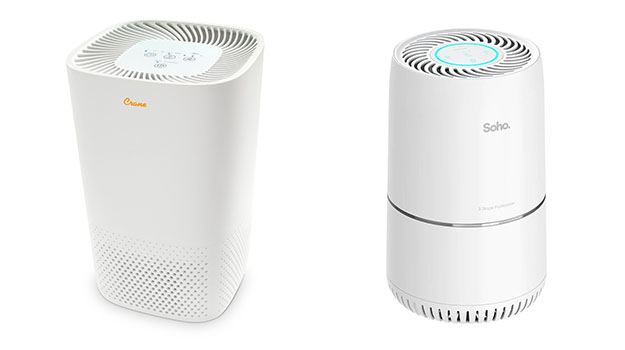
The environment goes through cycles of change, impacting the particulates in outdoor and indoor air. For example, as global temperatures increase, pollen seasons get longer while mold becomes more prominent due to its newfound opportunities for growth within these warmer conditions.
The effects of seasonal allergies are more than just a nuisance; they can have severe implications for your health. Pollen and mold concentrations are closely tied with respiratory functions, which means that even if you limit the outdoor time during the peak season to combat the allergen exposure as much as possible, it will never be enough because these tiny airborne particles find their way inside anyway! The air you breath can be dirty and harmful to your health. Air pollution isn’t just car exhaust or factory smoke; it also includes dust mites from bedding/carpets and mold, which are found in all environments, including homes. The question now is how do we prevent it? And can air purifiers help with allergies?
How Do Air Purifiers Work with Allergies?
Different types of air purifiers use a variety of filters to clean the atmosphere. One common type is filtration, where an adsorption system draws in many unwanted particles while trapping others on its surface. The best air purifiers for allergies will use a combination of leading technologies to trap, reduce and destroy airborne allergens. These include pollen grains from flowers or trees; mold spores found in damp environments such as bathroom tiles but can also come from furniture if it’s not adequately cleaned with protective anti-mold treatment before sale – this includes wood species too! We notice pet dander when our pets breathe out containing bacteria that cause lung infections. Lastly, dust-carrying particles are deep within their interior layers, even though you might see little.
Air Purifier for Dust and Dust Mites
The accumulation of dirt, skin cells, and allergens is what makes up dust. In addition to these nasty particles, there might be pest byproducts like pollen or pet dander that cause allergies when they come in contact with you.
Dust mites are one of the most common indoor allergens there are. They strive in a humid environment, especially on your furniture and carpets. High-quality air purifiers with HEPA filters are excellent at removing dust from the atmosphere, and ionic ones will destroy any biological contaminants they contain. UV light offers an additional advantage as it can also kill off mold, known to be present in some homes due to humidity or construction work nearby.
Air Purifier for Pollen Particles
The wind can carry pollen around your home, and it’s nearly impossible to get rid of all the little grains. It might seem like you’re safe if there aren’t any windows or doors open with proper ventilation, but even then, they’ll be floating in stagnant air inside! When someone with allergies inhales pollen, their body launches an immune response centered in the respiratory system. This can cause hay fever-type symptoms like sneezing and congestion. For people with asthma, symptoms can also include shortness of breath and difficulty breathing.
High-efficiency particulate air (HEPA) air filters on air purifiers can trap 99.97% of airborne particles with a diameter greater than 0.3 microns which is an incredible feat for any clean technology product! The most important thing you can do to prevent or reduce your exposure to pollen is air purify the room. A variety of air purifiers will get rid of these pesky grains, including HEPA and ionization ones which release negatively charged particles when they collide with neutral ones in an effort for both types, not just one type.
Air Purifier for Pet Allergies
Pet dander is the microscopic flecks of skin that can hang suspended in the air like dust. People with pet allergies breathe this material and experience host symptoms similar to those triggered by pollen. People with asthma or other respiratory conditions may be allergic to pet urine, feces, and saliva proteins. When these substances dry up, they can cause microscopic particles that enter your airways, just like dander does when you breathe. The best air purifier for pet allergies will use a HEPA filter to trap microscopic contaminants and ionization.
How Much Do HEPA Filters Help with Allergies?
Air purifiers with HEPA filters in your home are great for removing most of the particles that cause indoor and outdoor air allergies. But there are more than just airborne irritants and allergens, so keeping rugs clean is essential! You can do this by getting rid of their source or using a vacuum,
Choosing the Ideal Air Purifier for Your Room
Room and Air Purifier Size
A big question when choosing an air purifier is how much space you need. Some people want something lightweight and portable, while others opt out entirely of heavier models that they can place anywhere in their house or office building because they’re busy all day long with work – then come back at night to enjoy clean indoor air once again!
Filters
The best air purifiers for allergies will have a HEPA filter to help with the air quality. This type of filtration system can trap 99% or more allergens, including small particles like those which cause respiratory issues in many people with asthma and other conditions.
Allergen Removal
An air purifier can be the solution to your allergies. If you’re looking for one capable of tackling allergen-specific filtration such as pollen, dust, and pet dander, it should also have smoke or unpleasant odors.
Other Smart Features
The smart air purifier answers all your questions about what’s going on with regards to how clean or harmful it might be inside. Not only can you monitor trends in quality, but you also get alerts when they need changing!
Last Updated on
- Exhaust fan vs Ventilation Fan - September 20, 2022
- Can a Standing Fan Work Without Capacitor - September 16, 2022
- Table Fan vs Stand Fan - September 13, 2022
